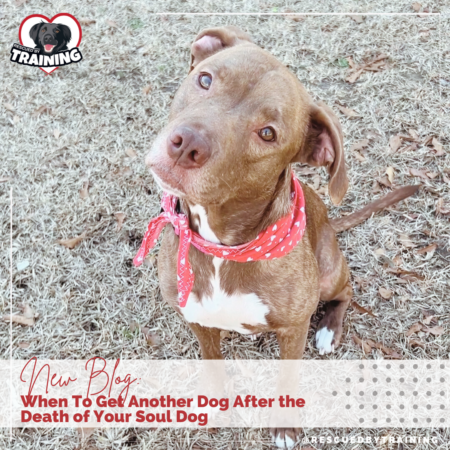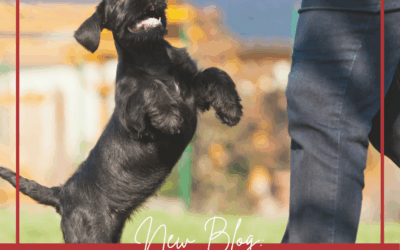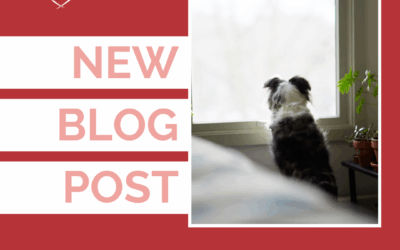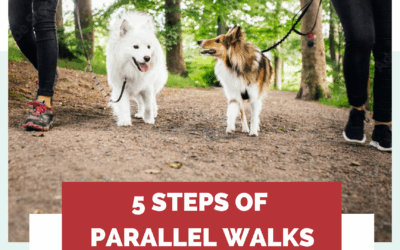As you may know, my husband and I recently adopted Gertie, a little over 10 months after saying goodbye to my heart and soul dog, BooBoo. I’ve been chronicling my grief journey over the last year and thought it might be helpful, on this 11 month anniversary of Boo’s death to talk about when it’s time for a new dog. It’s important to start with the obvious – my journey is not your journey, so you may not have the same feelings or thoughts about this but I wanted to share my experience.
“The risk of love is loss, and the price of loss is grief. But the pain of grief is only a shadow when compared with the pain of never risking love.” — Hilary Stanton Zunin
4661 days with BooBoo was never enough. No matter how long we have, it will never be enough. I love dogs. Duh, that’s why I do what I do in life – dog trainer, behavior consultant, foster mom, previous shelter trainer and decades of animal rescue volunteer work. I can never not have animals, especially dogs, in my life. I am incomplete without loving a dog. I am not my best person.
But I knew after Boo died, that I just wasn’t ready for a new dog right away. And there were times when I questioned whether I’d ever be ready. There is no timeline on grief or if or when someone is ready. The risk of when, or if, to open your heart to love again is a decision that nobody else can make for you.
This is the first difference in a lot of people. Some people, when they know their dog is declining or dying, can’t stand the thought of being without an animal, so before their dog dies, they go out and get another dog. This isn’t my personal choice, but I understand why people do it. And if that’s your choice, that’s perfectly OK but I needed time, a lot of time, to process and grieve BooBoo’s death.
At first going out in the world, I didn’t even want to look at or see other dogs, or people being happy with their dogs, because it made me miss Boo even more and reminded me she wasn’t here. But after a few months, I started to soften. And my husband was really missing having a dog in the house. So we returned to fostering. And we fostered for many months. With each foster I contemplated “was this the one?” and it was always no.
Around nine months after losing Boo there were two fosters that tugged at my heart for various reasons and they were very hard to say goodbye to when we returned them to the shelter. But I knew that while they were good dogs, they weren’t our dog. In a sense it was good it was getting harder to say goodbye and that I was getting a little attached because it meant I felt my heart softening a bit to the idea of a new dog.
Throughout this whole process John and I were talking about each foster, what we liked and what they would need work on. And I was making a list of things I was looking for or wanted in a new dog. And some things that were absolute deal breakers. This is something I had been working on for months as part of my grief journey, and what traits would fit with our lifestyle now and in the future as we make plans for life changes since any dog we would get would hopefully be with us for 10-15 years. And, as a trainer, I had certain things I need in a dog to be able to do my work, like eventually get them certified as a therapy dog so I can do therapy dog evaluations and use them as a stimulus dog if I ever return to in-person sessions. Trying to keep in mind, no dog is perfect (except Boo, hahaha), my list was long and pretty demanding. In the end, I had 16 traits (physical, emotional and behavioral) I was looking for in a dog. And, Gertie hit the mark on all of them, much to my surprise.
Here are other things I was thinking about during my journey of grief to new dog.
7 Things to consider before getting a new companion:
- Grieve your lost animal. I cannot emphasize this enough. You cannot hide from, distract yourself from or bury grief. You might be able to try to keep yourself busy and distracted and work a lot to avoid dealing with hard feelings, but eventually they will bubble up, probably at the most inopportune times. Feel your feelings. Process your grief. Cry. Throw things. Scream. Be sad. Be angry. Be confused. Feel guilty. And then remember all the love and all the things you did right. And bask in those memories.
- Don’t rush into decisions until you grieve. Well-meaning family, friends, and even professionals may suggest a new animal to give you comfort but while another pet may help you heal, it’s not a replacement for the one you lost. And, if you haven’t processed your grief, you may have a hard time bonding with a new companion.
- Make sure the whole family is in agreement. My husband and I were on very different grief timelines and that’s why fostering was such a win for us. It gave him the companionship he wanted and it gave me a way to test the waters about how I was feeling having a new dog in the home and where I was in my grief over Boo. But it is important everyone is on the same page about getting a new animal and committed to it. Bringing a new companion into the family before everyone is ready could be hurtful, cause resentment or diminish the relationship with the previous animal as insignificant. And especially with children, we never want to convey a message that beloved companions are easily replaced. (Read my post about helping kids navigate grief here.)
- Reflect on why you’re getting a new animal. We can never replace our lost ones so I’d be careful about getting a new animal that looks exactly like your previous one so you’re less inclined to compare your new pet with the memories of your deceased pet. You’re setting yourself up for disappointment, even if they’re the same breed, it’s unfair to compare the new one to the old one. And believe me, this is something I struggle with and know clients struggle with. It’s not easy not to compare.
- Fostering. If you’re unsure if you’re ready to open your heart again, not sure you want a permanent commitment or don’t have the financial resources to care for a new animal, fostering is a wonderful way to test your own readiness without a long-term commitment, while helping a homeless animal in the meantime. And, if it’s a right fit, like Gertie was for us, then you can always foster fail!
- Listen to your heart and nobody else. Only you know what is best for you. Well meaning friends and family will likely be pushing “when are you going to get another animal?” but do not let anyone bully you or put a timeline on your grief. If you feel little heart pangs, then your heart is probably telling you that you are ready. But for some people this never happens, or they find other ways, like fostering, dog sitting, dog boarding or volunteering at a shelter to fill that void in their heart, and that works for them. And that’s perfectly OK and the right choice for them.
- Be gentle with yourself. There will likely be feelings of regret, sadness, guilt and other big feelings you have to deal with even if you’re happy to be bringing in a new animal. I’ve wrangled with these feelings leading up to and post-adopting Gertie. It doesn’t mean I don’t like her or I think we made the wrong choice but it’s just a sign that I still really miss and love Boo and that I’m still grieving her in certain ways. And, really, I don’t expect that will ever completely go away. But recognizing that joy and sadness can co-exist is important. Grief can co-exist with new love and new experiences. And I believe that if animals had the capacity to tell us future wishes, that Boo would want me to be happy and that she would us to welcome another dog into our life and give them a chance at having an incredible life like she had. Loving another animal doesn’t reduce the amount of love I have for Boo. I think some people (myself included) may be hesitant to open their hearts again because they’re afraid it means they’ve “moved on” or that their grief is their last connection to their beloved.
Sometimes we don’t want to heal because the pain is the last link to what we’ve lost – JmStorm
If you’re grieving, I have a lot of grief resources and on that list is the Dakin Humane Society support group. It’s free and I find it incredibly helpful to connect with others having a similar experience, at various points in their grief timelines. Some people attending are one or two years into their journey and others are days into it, and everything in between. Grief can feel so very lonely so it’s helpful to have a place to have a community. People join from all over the world! If you are preparing for the loss of your own dog, remember I offer my doula services here. And of course I’m here for any of your training needs or you can book my special consult if you’re considering behavioral euthanasia. And my grief counselor Angela was instrumental in helping me navigate my grief, even as a doula myself, I needed extra support. There is no shame in getting help.
I recently finished The Grieving Brain, and it was so helpful to understand the physiological mechanisms of grief on the brain. This book was accessible and easy to understand and really helped me understand about complicated grief and the different things that may impact your grief and how having different coping mechanisms at different times can be really helpful and is something I sort of stumbled upon on my own during my journey. Sometimes I would ruminate, sometimes I would bury myself in work, sometimes I would look at pictures and videos, sometimes I would cry or scream or take some time in nature in familiar places. I think healthy grieving involves some combination of coping skills. But I really recommend The Grieving Brain so you can help understand you’re not going crazy and that there’s real, evidence based reason why you’re feeling or thinking things you are. And I’m looking forward to reading The Grieving Body, knowing that grief impacts not only our brain but our cardiovascular, endocrine, and immune systems and likely has larger implications for long-term well-being, long beyond our loss.
As part of my doula services, I’ve got this resource page, which I update regularly. I also have my free Advance Care Directive worksheet available for download and this post about helping kids navigate grief. If you’ve missed my previous grief posts:
- first post about Boo passing
- 2 month update
- 4 month update
- 6 month update
- 8 month update
- 10 month update
- watch this memorial video of Life of Boo, with music composed by my husband, John.
- Video of BooBoo crossing the rainbow bridge (Lake Lure Rainbow Bridge, destroyed in Hurricane Helene floods but being rebuilt!)
Give your pups some extra treats from me and BooBoo, for free…don’t make them work for it! If you record it, please share it with me! Free Treats In Honor Of BooBoo!
If you are preparing for the loss of your own dog, remember I offer my doula services here. And of course I’m here for any of your training needs or you can book my special consult if you’re considering behavioral euthanasia.
If you’d like to support me and my free resources, like my downloads and this educational blog, please consider making a small donation here:
Thanks for being here!
![]()




